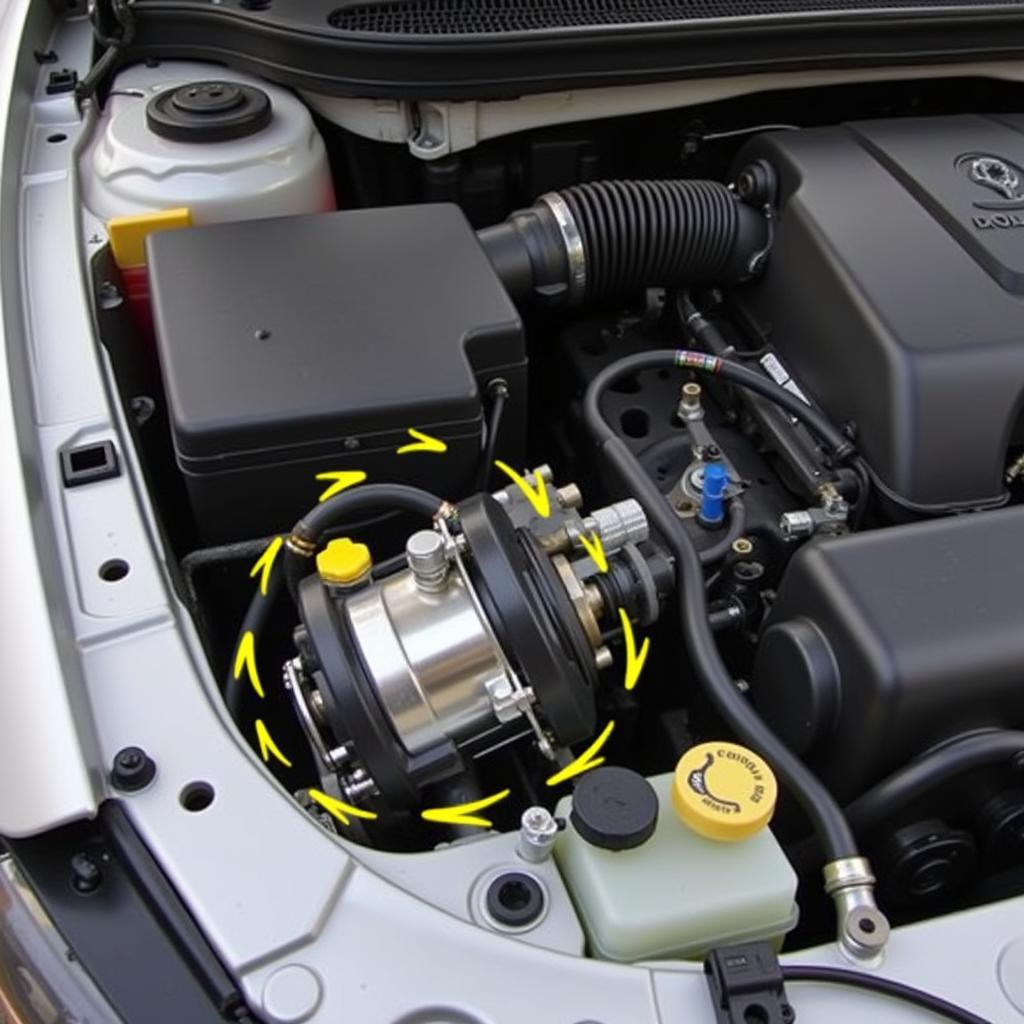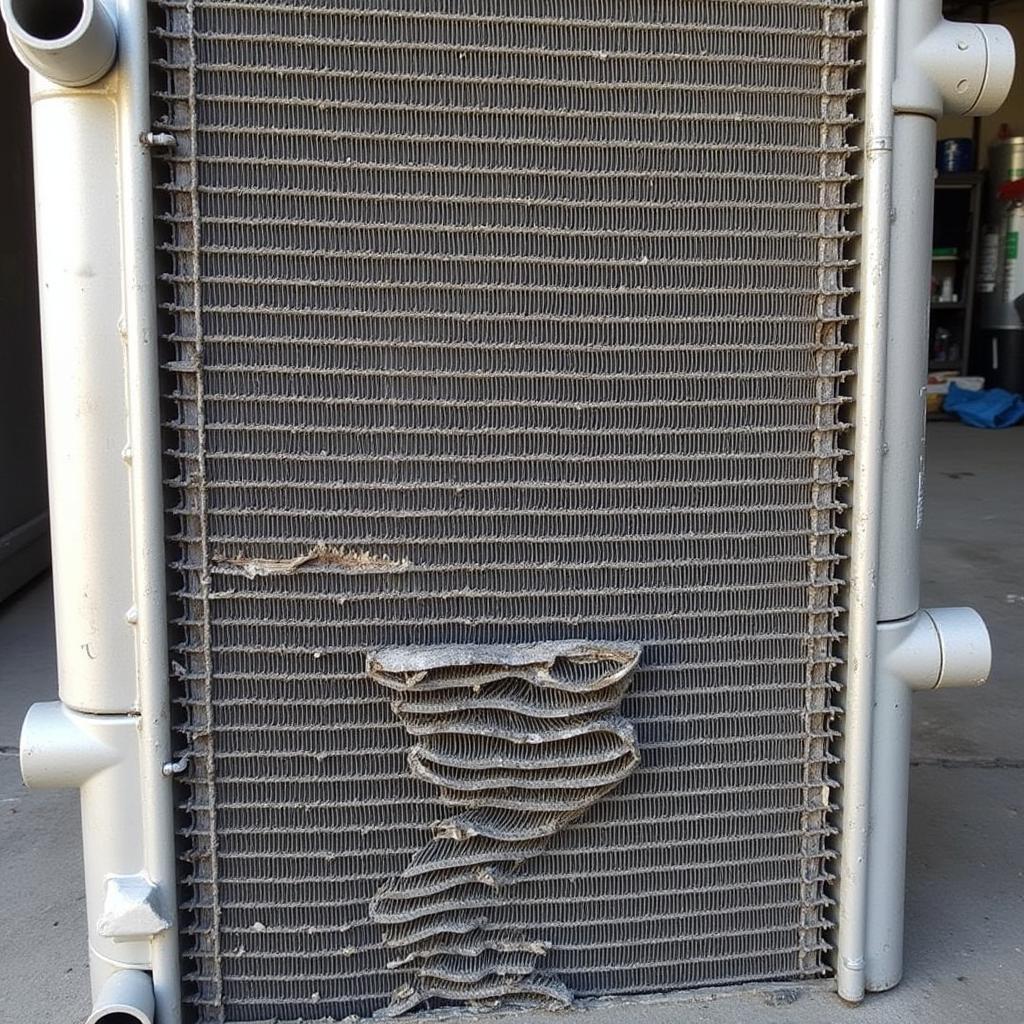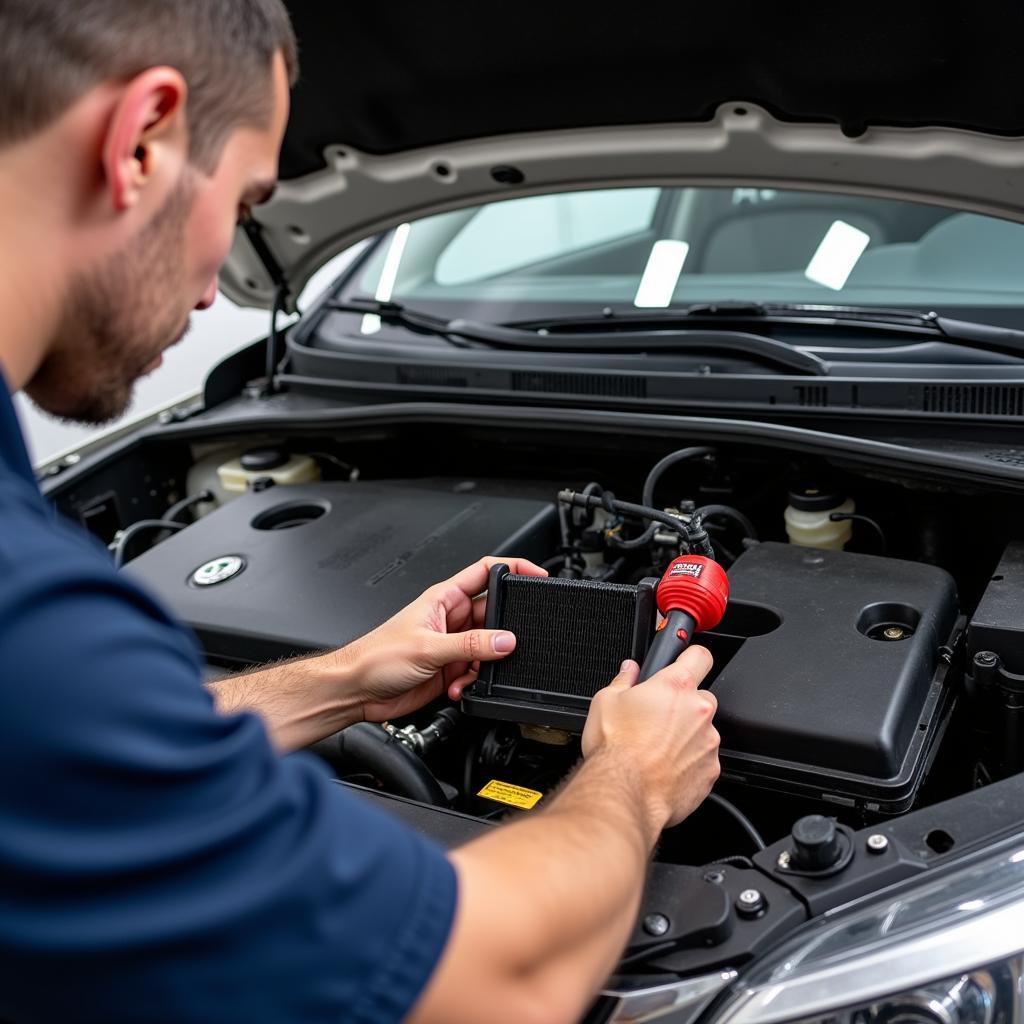Imagine this: It’s a scorching summer day, and you’re stuck in traffic. You turn on your car’s AC, but instead of a blast of cool air, you’re met with a disappointing, lukewarm breeze. This is a telltale sign that your car’s AC condenser might be on the fritz. Don’t sweat it! This comprehensive guide will walk you through everything you need to know about How To Fix Ac Condenser Car problems.
 Car AC Condenser Location
Car AC Condenser Location
Understanding Your Car’s AC Condenser
Before we delve into the nitty-gritty of fixing a faulty condenser, let’s take a moment to understand what it is and how it works. Your car’s AC condenser is a vital component of the air conditioning system. It’s responsible for transforming the refrigerant from a high-pressure, high-temperature gas into a high-pressure, low-temperature liquid. This process is crucial for cooling the air that’s blown into your car’s cabin.
The condenser resembles a small radiator, located at the front of your vehicle, often right next to the main radiator. It’s typically made of aluminum and consists of thin tubes and fins that facilitate heat exchange. As hot refrigerant gas flows through these tubes, the condenser dissipates the heat to the surrounding air, causing the refrigerant to condense into a liquid.
For more information on car AC repair and related topics, check out our guide on how to fix leak in car ac condenser.
Common AC Condenser Problems
Just like any other car component, the AC condenser is susceptible to wear and tear. Here are some of the most common problems you might encounter:
-
Leaks: A leak in the condenser is a frequent culprit behind AC woes. These leaks can occur due to corrosion, damage from road debris, or wear and tear on the O-rings and seals.
-
Blockages: Over time, dirt, debris, and insects can accumulate on the condenser’s fins, obstructing airflow and reducing its efficiency.
-
Damage: Physical damage from accidents or road debris can also render your AC condenser useless.
 Damaged Car AC Condenser
Damaged Car AC Condenser
Troubleshooting AC Condenser Issues
Now that you know what to look for, how can you tell if your AC condenser needs attention? Here are some telltale signs:
-
Warm air blowing from the vents: This is often the first and most obvious sign that something is wrong with your AC system, and the condenser is a likely suspect.
-
Unusual noises: Hissing or bubbling sounds coming from the condenser area could indicate a refrigerant leak.
-
Visible damage: Inspect your condenser for any signs of physical damage, leaks, or excessive dirt and debris buildup.
-
AC system not cooling efficiently: If your AC is struggling to cool your car, even after recharging the refrigerant, it could point to a problem with the condenser.
“A well-maintained AC system can make all the difference during those hot summer months,” says John Miller, a seasoned automotive technician with over 20 years of experience. “Regular inspections and prompt repairs can save you from discomfort and costly replacements down the line.”
How to Fix AC Condenser Car Problems
While some AC condenser repairs might require professional help, there are a few things you can try at home:
1. Cleaning the Condenser
Regularly cleaning your condenser can prevent blockages and improve its efficiency. Here’s how:
-
Locate the condenser: Open the hood and locate the condenser at the front of the engine bay.
-
Remove debris: Use a soft brush, compressed air, or a gentle stream of water to remove any loose dirt, leaves, or debris from the condenser fins.
-
Apply cleaner (optional): For stubborn grime, consider using a dedicated condenser cleaner. Follow the manufacturer’s instructions carefully.
-
Rinse and dry: If you used water or cleaner, rinse the condenser thoroughly and allow it to dry completely before starting your engine.
This guide on [air conditioner fix car] (https://autotippro.com/air-conditioner-fix-car/) can provide you with additional information on addressing various car AC problems.
2. Recharging the AC System
If your AC system isn’t cooling properly and you suspect a minor refrigerant leak, you can try recharging it using a DIY AC recharge kit. However, keep in mind that this is a temporary solution, and it’s crucial to address the underlying leak to prevent further damage.
3. Seeking Professional Help
For more serious problems like major leaks, physical damage, or if you’re not comfortable working on your car’s AC system, it’s best to seek help from a qualified mechanic. They have the expertise, tools, and equipment to diagnose and repair your AC condenser safely and effectively.
If you’re wondering, “[where to get my car ac fixed near me](https://autotippro.com/where-to-get-my car-ac-fixed-near-me/)” our comprehensive directory can help you find reliable AC repair shops in your area.
 Mechanic Repairing Car AC Condenser
Mechanic Repairing Car AC Condenser
Cost of AC Condenser Car Repair
The cost of repairing or replacing your car’s AC condenser can vary depending on several factors, including the make and model of your vehicle, the severity of the problem, and labor costs in your area.
-
Repairing a leak: Minor leaks can often be repaired by replacing O-rings or seals. This could cost anywhere from $100 to $400.
-
Replacing the condenser: If your condenser is damaged beyond repair, you’ll need to replace it. A new condenser can cost between $150 and $500, while labor costs can add another $200 to $400 to the total bill.
To get a better understanding of the potential costs involved, you can refer to our detailed guide on ac fix cost car.
“Ignoring AC problems can lead to more extensive and costly damage down the road,” advises Sarah Jenkins, a certified mechanic and automotive blogger. “Addressing issues early on can save you money and hassle in the long run.”
Conclusion
A properly functioning AC condenser is essential for a comfortable driving experience, especially during hot weather. By understanding the common problems, knowing how to troubleshoot them, and seeking professional help when needed, you can keep your car’s AC blowing cold for years to come. Remember, regular maintenance and timely repairs are key to avoiding those sweaty, uncomfortable rides.
For any assistance with your car AC or other automotive concerns, feel free to reach out to us at AutoTipPro. Our team of experts is here to help you with all your car maintenance and repair needs.
Contact us:
- Phone: +1 (641) 206-8880
- Office: 500 N St Mary’s St, San Antonio, TX 78205, United States
FAQs
1. How often should I clean my car’s AC condenser?
It’s generally recommended to clean your AC condenser at least once a year, preferably in the spring before the hot weather arrives. However, if you frequently drive in dusty or debris-prone areas, more frequent cleaning might be necessary.
2. Can I drive my car with a leaking AC condenser?
While you might technically be able to drive with a leaking AC condenser, it’s not recommended. A refrigerant leak can lead to reduced cooling efficiency, potential damage to other AC components, and environmental harm.
3. How long does it take to replace a car AC condenser?
Replacing a car AC condenser typically takes a few hours, depending on the make and model of your vehicle and the mechanic’s workload.
4. Can a faulty AC condenser affect my car’s engine?
While a faulty AC condenser won’t directly damage your car’s engine, it can put additional strain on it, potentially leading to reduced fuel efficiency and increased wear and tear.
5. How can I prevent future AC condenser problems?
Regularly cleaning the condenser, inspecting it for leaks or damage, and addressing any AC issues promptly can help prevent future problems and prolong the lifespan of your AC system.
We hope this guide helps you understand how to fix AC condenser car issues. Remember, staying informed and proactive about your car’s maintenance is essential for a smooth and enjoyable driving experience.





Leave a Reply